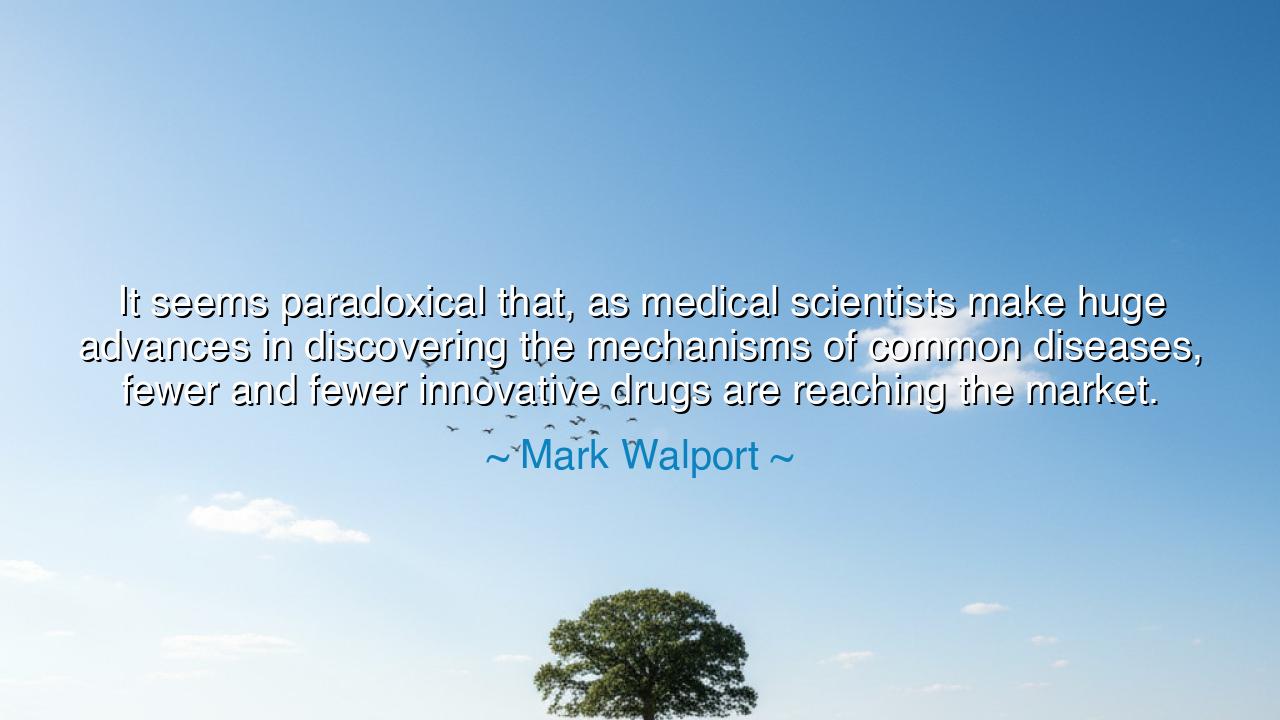
It seems paradoxical that, as medical scientists make huge
It seems paradoxical that, as medical scientists make huge advances in discovering the mechanisms of common diseases, fewer and fewer innovative drugs are reaching the market.






Hear, O children of knowledge, the words of Mark Walport, whose wisdom unveils a troubling riddle of our age: “It seems paradoxical that, as medical scientists make huge advances in discovering the mechanisms of common diseases, fewer and fewer innovative drugs are reaching the market.” This saying is both lament and warning. It speaks of the strange contradiction that while our understanding of the mechanisms of disease deepens—while we map the genome, trace the pathways of cells, and unlock secrets once hidden in the shadows—the fruits of this knowledge do not always ripen into medicines that heal the people.
From the dawn of medicine, discovery and healing were seen as inseparable. The ancient physicians of Egypt sought herbs in the desert and recorded their uses on papyrus, believing that to understand the ailment was to discover its cure. Hippocrates, too, saw no division between knowledge and practice; to know the cause of fever was to know how to cool it. Yet Walport names a paradox of modern times: knowledge soars, yet remedies stumble. Our libraries swell with research, yet patients wait with empty hands.
Why is this so? The path from discovery to medicine is long, treacherous, and costly. Laboratories reveal truths in mice and in cells, but the journey to a safe and effective drug for humans is a desert where many hopes perish. Trials fail, costs rise, and companies retreat, fearing the weight of risk. Thus, though our knowledge ascends like a mountain, the well of practical healing often runs dry. Walport reminds us that wisdom alone is not enough; wisdom must be harnessed with courage, with perseverance, and with systems that serve the many, not only the profitable.
Consider the tale of penicillin. Alexander Fleming discovered its power in 1928, yet for more than a decade, it lay dormant, neglected. It was not until World War II, when scientists in Britain and America joined forces, that the drug was refined and produced on a vast scale, saving countless lives. Here lies the lesson: knowledge by itself is fragile. It must be carried forward by collaboration, by investment, and by a shared sense of urgency. Without these, discoveries wither before they can blossom into healing.
Walport’s words shine a mirror upon our age. We can unravel the intricate dance of proteins, yet millions still suffer without cure. We can explain disease in terms of molecules and genes, yet we struggle to transform this truth into a medicine that sits upon the healer’s shelf. This paradox is not merely a scientific problem; it is a moral one. For what good is knowledge if it does not serve the suffering? What use is discovery if it remains locked in the scholar’s scroll?
The lesson is this: knowledge must be married to action, and discovery to compassion. Let each generation of scientists remember that their labor is not for the glory of journals, but for the relief of the sick. Let leaders and citizens alike support systems that transform discoveries into treatments, even when profit is uncertain, for the value of a life saved is beyond measure. And let us remember that innovation requires not only intellect, but persistence and cooperation across borders, disciplines, and generations.
So, O hearers, let Walport’s paradox stir you not to despair, but to vigilance. Let it remind us that the path of healing is unfinished, and that the bridge between knowledge and medicine must be strengthened by human will. Support those who labor to turn discovery into cure, question systems that slow this journey, and never forget that wisdom is hollow unless it touches the lives of the afflicted.
Thus, Walport’s words become a guiding flame: though we live in an age of dazzling insight, our task is to ensure that such light does not remain distant, but shines upon the bedside of the suffering. This is the charge handed down to us, and this is the torch we must carry into the future.






AAdministratorAdministrator
Welcome, honored guests. Please leave a comment, we will respond soon